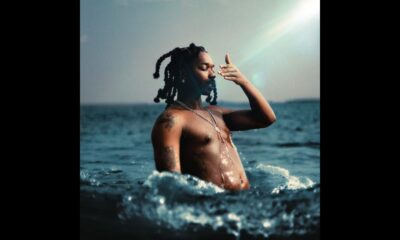Features
Meeting Burna Boy, Falz and Becoming a Full Time Cinematographer; Shedrack Salami in Today’s “Doing Life With…”
Doing Life With… is a BellaNaija Features series that showcases how people live, work, travel, care for their families and… everything in between. We are documenting the lives of all people and ensuring everyone is well-represented at BN.
Did you miss our last conversation with Maureen Onwunali? You can catch up here.
Today, we’re doing life with Shedrack Salami, a 2024 StoryMi Academy Fellow, sponsored by the French Embassy in Nigeria. As part of the fellowship, he directed Beyond Olympic Glory, a short documentary following a young female boxer from the slums of Bariga, Lagos, whose Olympic dreams are crushed by a doping scandal.
Enjoy the conversation!
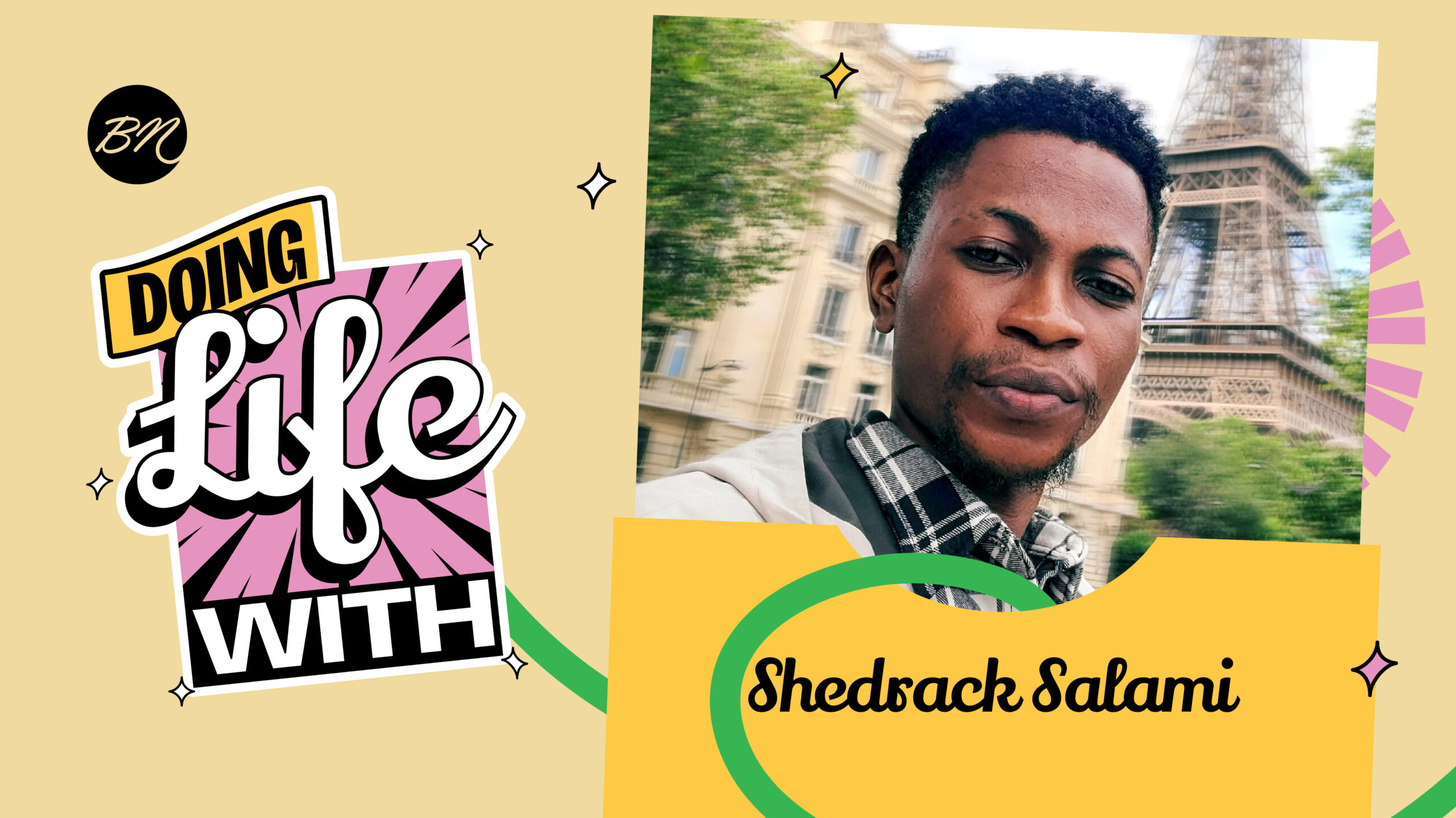
Hey Shedrack. How do you feel right now?
I’m feeling great and super thankful. A lot of wonderful things have been happening around me lately, and I owe it all to God for everything I’m experiencing right now. Thank you for asking.
Beyond Olympic Glory introduces anyone to your eye—the way you frame pain, power, and purpose in your visuals. That film showed us the kind of storyteller you are. When did you realise this was what you wanted to do—use a camera to tell human stories?
Thank you so much, that means a lot. Beyond Olympic Glory broke something open in me too. It’s one of the hardest projects I’ve worked on and am still working on. But honestly, the journey started long before I ever picked up a camera. It goes back to around 2014 to 2018.
At that time, I wasn’t doing photography or film yet. I was just an artist, drawing, painting, creating visual art. But over time, I started to feel empty. It felt like I was doing the same thing as everyone else. And if you know me, you know I always try to do things differently. No matter how crowded the space is, I always want my work and the way I carry myself to stand out.
That desire to be different led me into body art. But it wasn’t just about standing out. It was my way of responding to what I saw around me. I had been through a lot, and art became my way of responding to those realities.
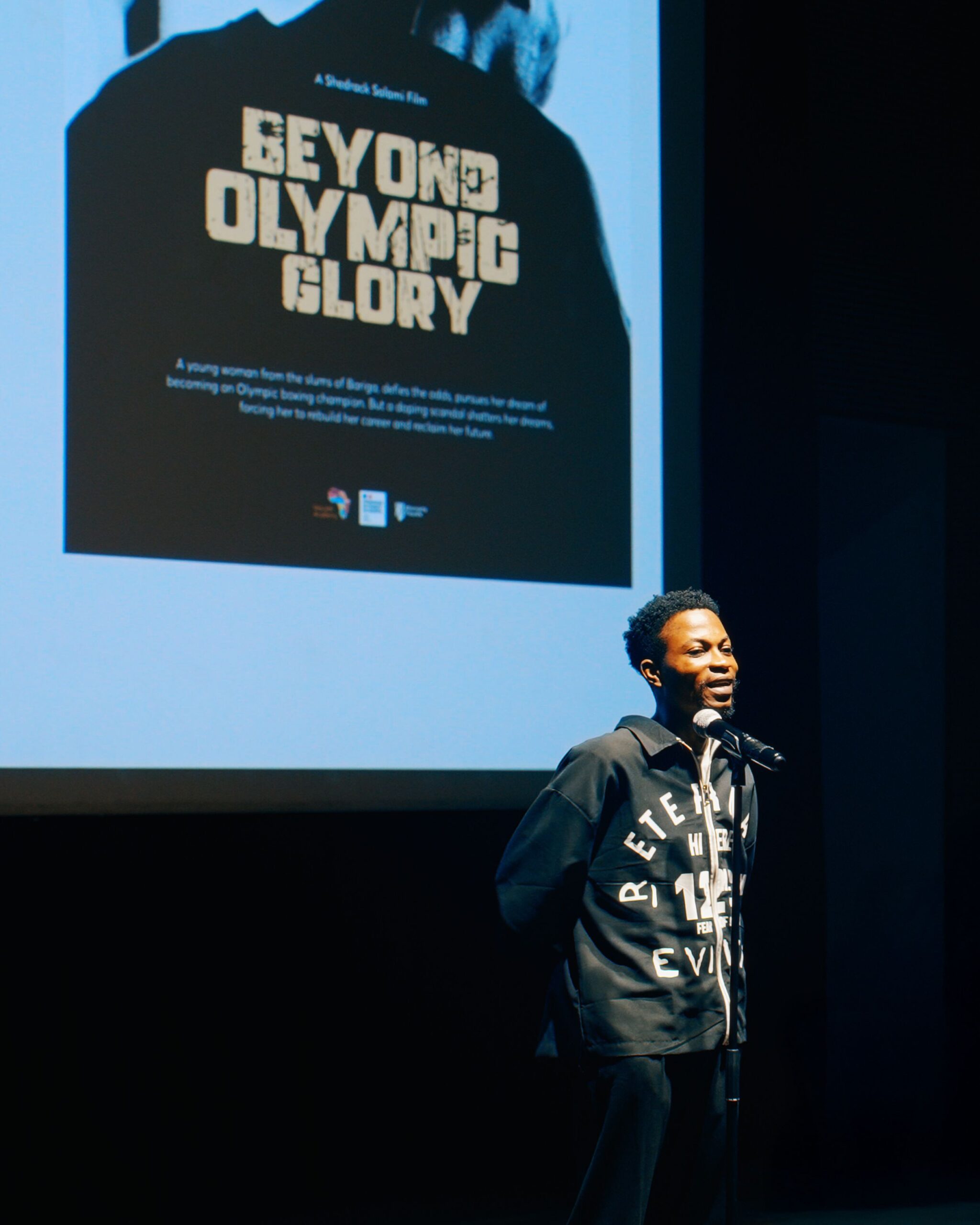
In 2018, I started using the human body as a canvas to speak on real issues like gender-based violence, drug abuse, electoral malpractice, and even public health crises like the COVID-19 pandemic. I also made art in response to movements like #EndSARS and calls for police reform in Nigeria. These weren’t just headlines to me; they were things I saw around me, things that touched my life and the lives of people I know.
In September 2022, everything changed. I got a call from my friend Leiba Love, a Trinidadian-American filmmaker who had just arrived in Nigeria at the time. She liked my work and connected me to Priscilla Nzimiro Nwanah, a Nigerian film producer and director based in the U.S. Pris reached out and asked if I would be interested in working on a documentary project. At first, my role was just to film the behind-the-scenes.
Back then, I was working a 9-to-5 job as a graphic designer. It wasn’t really where my heart was, and I had always wanted to break free into cinematography. So I saw this as a golden ticket to chase my dream. I didn’t even think twice, I quit my job and jumped at the opportunity. That one project became the start of my journey into documentary filmmaking. I used it to learn everything I could about crafting authentic stories.
That’s how it all began.
Can you walk us through your background—growing up in Nigeria, education, and any memory from your early life that continues to shape the way you create today?
I was born in Kogi State, Nigeria, but I didn’t grow up in one place. My family moved around a lot. I spent part of my early childhood in Fiditi, Oyo State, from around 2003, where I had my primary education, and later we moved to Ibadan in 2009. Growing up in different parts of Nigeria gave me a broader perspective on life and culture, but one thing that remained constant was the influence of my family.
I was raised in a modest home by incredibly supportive, yet disciplined parents. My mom, especially, was very strict; there were a lot of things I wasn’t allowed to do, particularly as the first child. While it was tough at the time, that upbringing instilled in me a deep sense of discipline, responsibility, and independence from an early age.
Art became my escape. I loved drawing, and even though my parents disapproved of it, I couldn’t let it go. During junior secondary school, I secretly enrolled in art training, which I attended after school. I often got home late, and when my mom asked why, I pretended I had stayed after school for lessons. When she eventually found out, it was difficult, but by that time, my passion for art had already taken root.
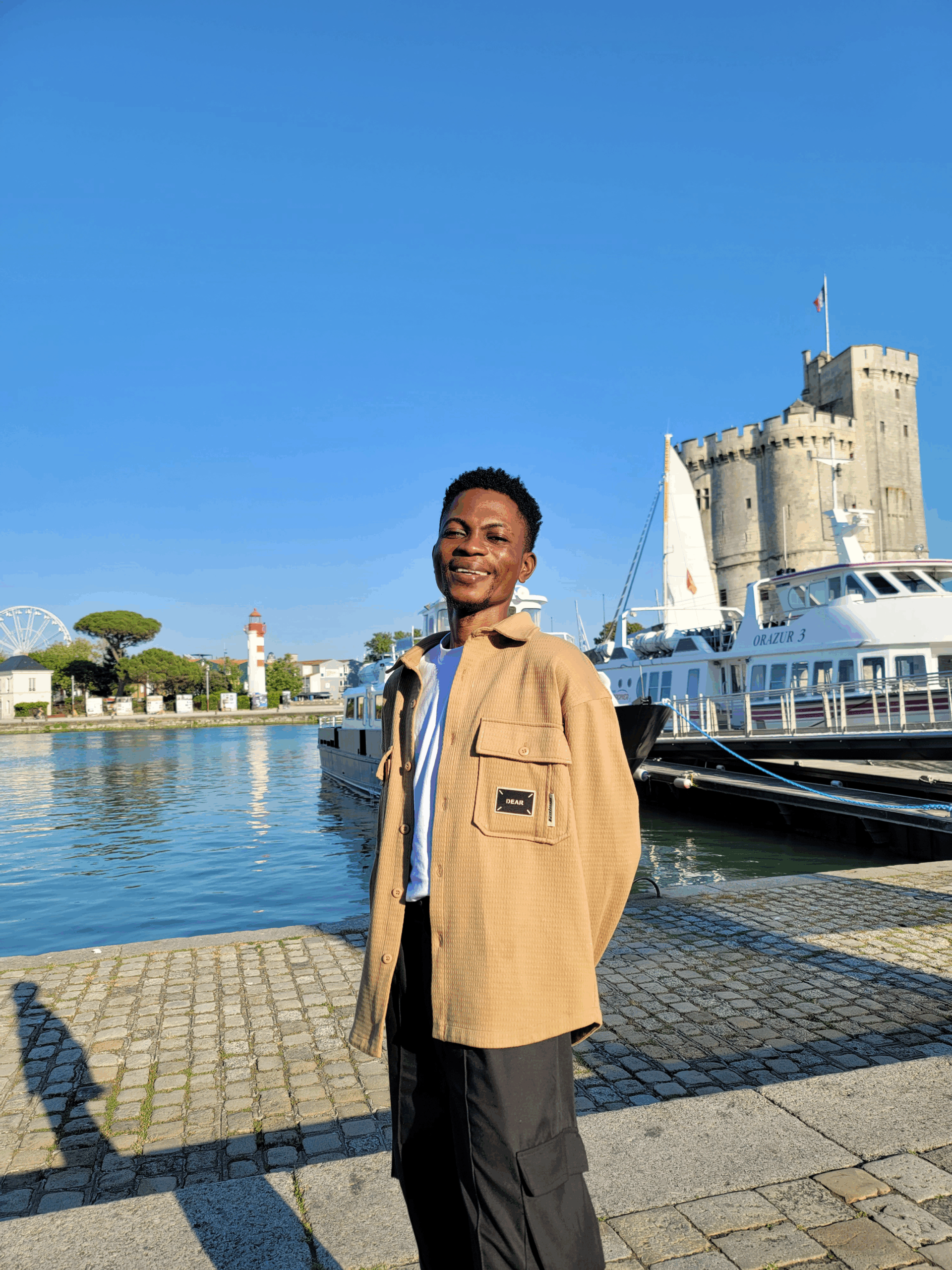
I went on to study Sociology at Kogi State University. During my time there, I began building a career for myself. I took on all kinds of creative jobs, art, crafts and graphic design, all of these just to support my education and sustain myself without relying on my parents. I also started drawing portraits of celebrities, which quickly gained me recognition and respect. I created and presented artworks to celebrities like Burna Boy, whom I met in 2015, 2face Idibia, Vector, Juliet Ibrahim, DJ Neptune, Falz and many more. That period was a major turning point; it gave me exposure and taught me how to turn my creativity into something powerful and impactful.
Looking back, the combination of a strict upbringing, the need to be self-reliant and my refusal to give up on my passion shaped the person I am today: resilient, disciplined and passion-driven.
You’ve evolved through several creative phases—from graphic design to photography, and now cinematography. Looking back, what would you say was the most transformative moment of your creative journey so far?
That real turning point for me came when I was selected to be part of the StoryMi Academy documentary film fellowship, sponsored by the French Embassy in Nigeria. It changed my life in more ways than I can count. It gave me a space to grow, to learn, and to be mentored by the best. It opened doors I never thought would open so fast. My work began to travel, people started to notice, and I began to believe more deeply in my voice as a filmmaker. Through the fellowship, my film Beyond Olympic Glory was born. StoryMi didn’t just support my film, it supported my growth. It reminded me that my background, my struggles, and my perspective are not limitations; they are my strongest tools. That’s the moment I truly became a storyteller.
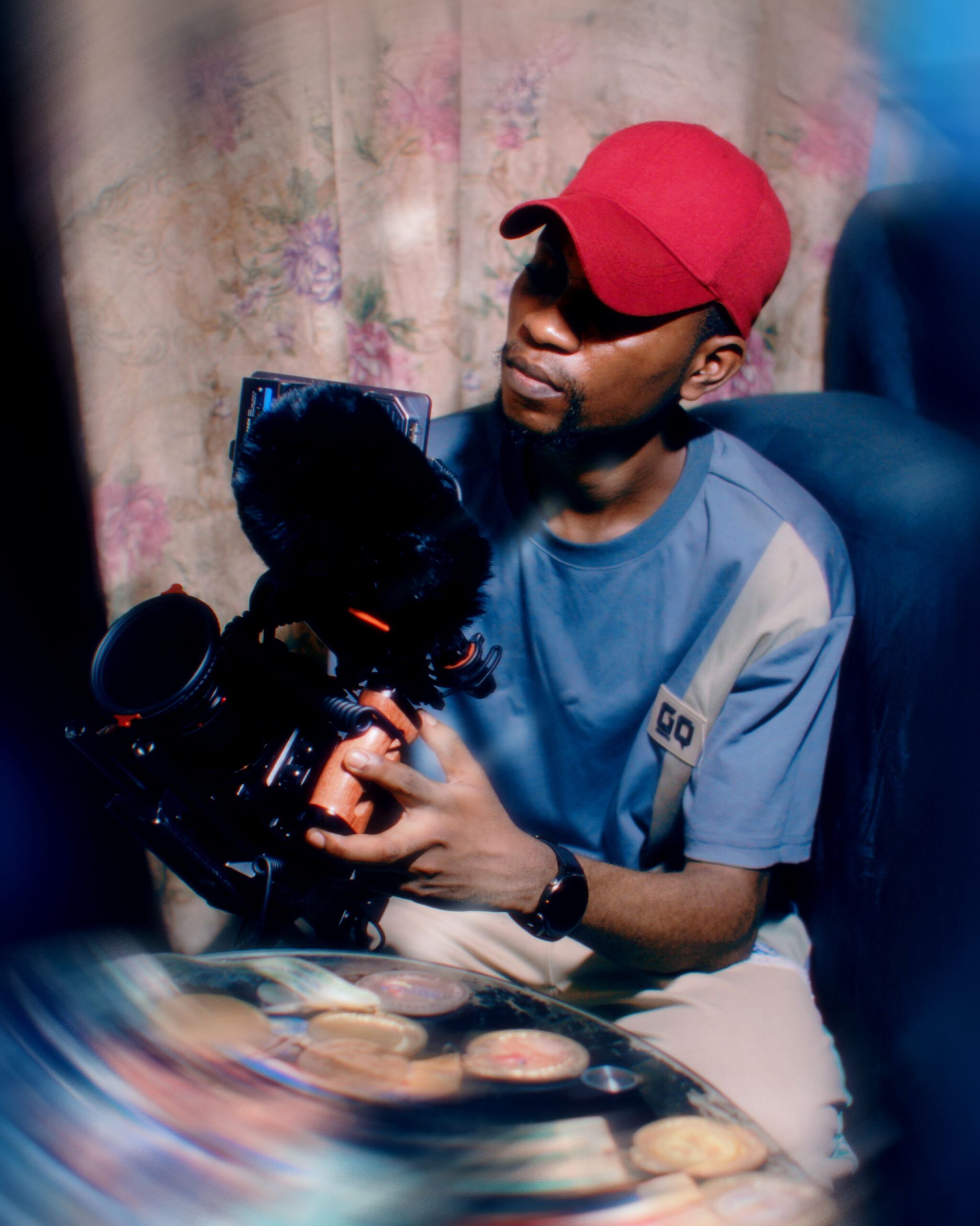
Beyond Olympic Glory tells a deeply personal story through a striking visual lens. What inspired you to create that film, and what part of it challenged you the most as a filmmaker?
Beyond Olympic Glory was born out of a passion to tell the kind of story that often gets left out of the spotlight, stories of people who have to work twice as hard to prove themselves. Cynthia Ogunsemilore’s story struck something in me from the very beginning. It wasn’t just about boxing. It was about identity, dignity, and becoming a symbol of hope for young Black women who are told to stay small.
The biggest challenge while working on the film came when reality threw us off balance, when Cynthia was suspended from the 2024 Olympics just a day before her first fight. That moment tested me as a filmmaker as well as a human being trying to hold space for someone else’s truth. I had to adapt emotionally and structurally. I had to ask myself, how do I stay honest without turning her pain into a spectacle? It was hard. It forced me to lean on empathy, rethink my narrative arc and run to my mentor Louise Monlaü for guidance, who then encouraged me to trust the story and learn to adapt.
In many ways, that shift made the film even more personal to me. It forced me to listen more. It deepened the soul of the film, and it made me a better storyteller.
What’s a typical day in your life like? What does a regular day in your life look like now, between directing, editing, and finding time for yourself?
Well, I don’t know if my lifestyle is boring, maybe someone needs to tell me that, but a typical day for me begins between 6 and 8 a.m., depending on how early I went to bed. My day always begins with prayer. I spend anywhere from 30 minutes to 1 hour in worship and prayer; it’s my way of grounding myself before everything else kicks off.
After that, I do a bit of exercise right in my room for 10 – 15 minutes, just some home workouts to get my body moving. Then I prepare to start the day properly. I check emails, respond to messages, and jump on early calls with my team. I work with different individuals and organisations, so mornings are for catching up on whatever came in overnight.
Two to three times a week, I have cinematography classes with my students from 10 a.m. to 4 p.m., which usually takes up the bulk of my day. On those days, I shift most of my other work and meetings to the evening.
On regular days, once I’ve cleared the morning tasks, I have breakfast and settle at my home-office desk where all the magic happens: editing, researching new stories, learning new things, taking courses, and attending meetings.
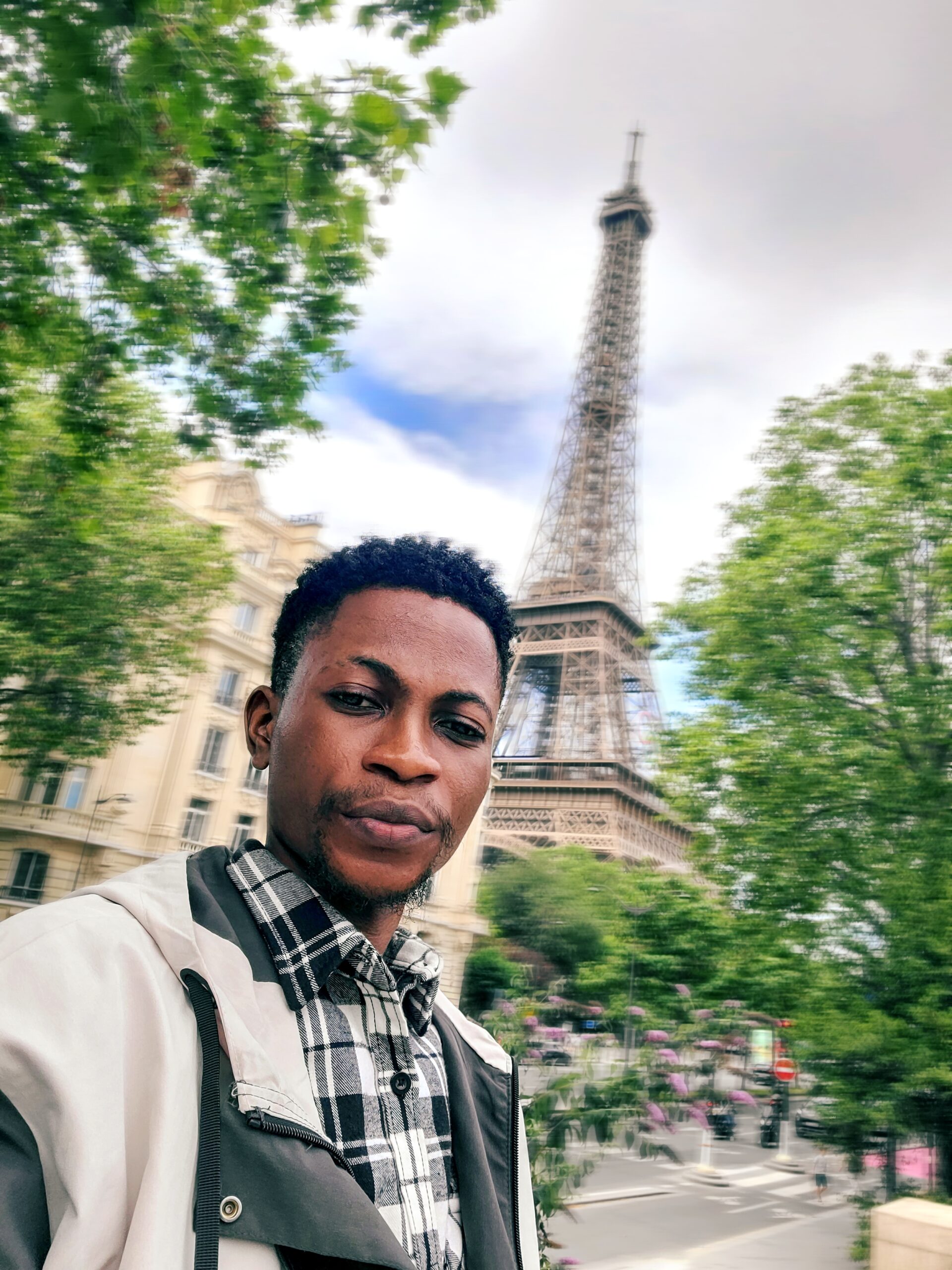
In the evening, I take a walk, then it’s back to work and maybe watching a movie. At night, I pray again for about 30 minutes.
Oh yeah, one of the highlights of my day is music. I love music from the ’70s and ’80s, and some of my favourites are from Prince Nico Mbarga and Rocafil Jazz. I also enjoy Congolese singers like Kanda Bongo Man, Theo Blaise Konkou, and sometimes Ladysmith Black Mambazo. If I’m not listening to them, I will be playing worship music and just staying in that atmosphere, worshipping and working. So yeah, pray, work, learn, listen to music, repeat.
What’s the ultimate dream for you, Shedrack? Not just as a filmmaker, but as a person navigating life, creativity and meaning
I want to keep telling powerful stories from around the world. I want to keep growing, pushing myself, and using my voice to inspire young storytellers, especially those from places like mine, where big dreams can feel out of reach.
But more than that, my biggest dream is to build a home, to have my own family. I’ve worked most of my life, and I’m thankful to God that it’s starting to pay off. But the truth is, I don’t want to spend the rest of my life only chasing projects and deadlines. I want to settle down, have kids, and be truly present with them, more than I’ve ever been with work.
So yes, I will keep creating, keep travelling, keep telling stories that matter. But more than anything, I want to come home to love, to family, to peace. That’s the dream.
Thank you for being on Doing Life With, Shedrack
Thank you for having me.
_____________________
Many thanks to Shedrack Salami for having this conversation with us and answering all our questions – and swiftly too, we must add.
Do you love this content, have any feedback for us or want to be a BellaNaija Features contributor? We’d love to read from you. Shoot us an email: [email protected]. Join us on Saturday for the next episode!






